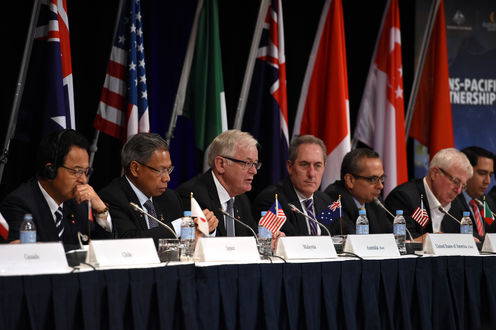
Talks that were meant to finalise the Trans Pacific Partnership wound up in Hawaii late last week without reaching a final deal. Over the last five years, 12 countries – Australia, Brunei, Canada, Chile, Japan, Malaysia, Mexico, New Zealand, Peru, Singapore, the United States and Vietnam – have been involved in negotiating the final text of the deal.
Despite the setback, there will be a strong push to sort out the remaining issues in August. After that the Canadian and US election cycles will make further progress in negotiating the trade deal next to impossible. And one of the most highly charged matters negotiators will be trying to resolve is intellectual property protections for medicines.
Over the next few weeks, Australia’s trade minister, Andrew Robb, will be under intense pressure to renege on the government’s oft-repeated commitment to reject anything in the deal that could undermine the Pharmaceutical Benefits Scheme (PBS) or increase the cost of medicines for Australians.
Data exclusivity
A key issue affecting drugs is the length of the data-exclusivity period for a class of medicines called biologics, which are produced from living organisms. Biologics include many new and very expensive cancer medicines, such as Keytruda, a melanoma drug recently listed on the PBS. Without the PBS subsidy, it would cost over A$150,000 to treat a patient for a year.
Data exclusivity refers to the protection of clinical trial data submitted to regulatory agencies from use by competitors. It’s a different type of monopoly protection to patents. While a product is covered by data exclusivity, manufacturers of cheaper follow-on versions of the product can’t rely on the clinical trial data produced by the originator of the drug to support the marketing approval of their product.
Section 25a of Australia’s Therapeutic Goods Act provides for five years of data exclusivity for all medicines. It makes no distinction between biologics and other drugs. Data exclusivity provides an absolute monopoly that, unlike a patent, can’t be revoked or challenged in court.
The powerful biopharmaceutical industry lobby in the United States has been seeking 12 years of market exclusivity for biologics.
Facing intense opposition from all other countries, the US trade representative fell back this week to eight years. While this was heralded as a new level of “flexibility” in the US position, in reality it remains a significant extension of intellectual property rights in most of the TPP countries.
Thus far, the Australian delegation has apparently maintained the position that it will not go beyond existing domestic law. Days before the talks broke up, the trade minister indicated in an interview on ABC Radio National that he didn’t see the sense in accepting a longer monopoly for biologics.
Good reasons to not budge
Three factors are likely to be contributing to this resolve. The first is the costs of extending monopolies. These are likely to be hundreds of millions of dollars a year in the short term and could rise exponentially in the longer term as patents gradually expire on biologics already listed on the PBS.

Another pressing consideration is the degree of political opposition to longer medicine monopolies in Australia. Extending the period of data exclusivity would require an amendment to the Therapeutic Goods Act – a move Labor, the Greens and many independents would strongly oppose. And the failure to get implementing legislation through the Senate could compromise the whole deal.
The third factor is the lack of progress in bargaining for access to US markets; the US reportedly made only a token offer on sugar and withdrew an earlier offer on dairy products.
Eight years of data exclusivity won’t be an appealing option for any of the other TPP countries, with the exception of Japan and Canada, which already allow for eight years. New Zealand’s trade minister recently faced outrage at home over admissions that the cost of medicines may be expected to increase after the agreement. The country’s opposition, also Labor, has declared it won’t support a deal that raises the costs of medicines.
The US stance itself is contradictory as the Obama administration has been trying to reduce the exclusivity period for biologics to seven years, to speed up the availability of cheaper alternatives and save an estimated US$16 billion in the next decade.
It seems clear to everyone except US negotiators – and biopharmaceutical industry lobbyists – that the demand for extending data exclusivity for biologics needs to be dropped if the TPP is to be finalised.
Deborah Gleeson receives funding from the Australian Research Council. She has received funding from various national and international non-government organisations to attend speaking engagements related to trade agreements and health, including the TPP. She has represented the Public Health Association of Australia on matters related to the TPP, including at the recent TPP negotiations in Maui.
Ruth Lopert does not work for, consult, own shares in or receive funding from any company or organization that would benefit from this article, and has disclosed no relevant affiliations beyond the academic appointment above.
